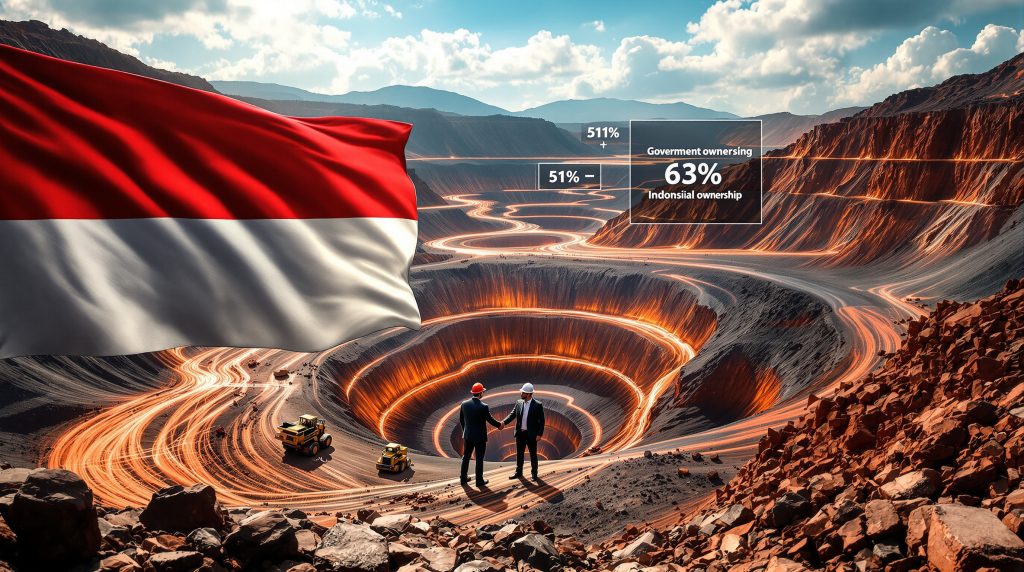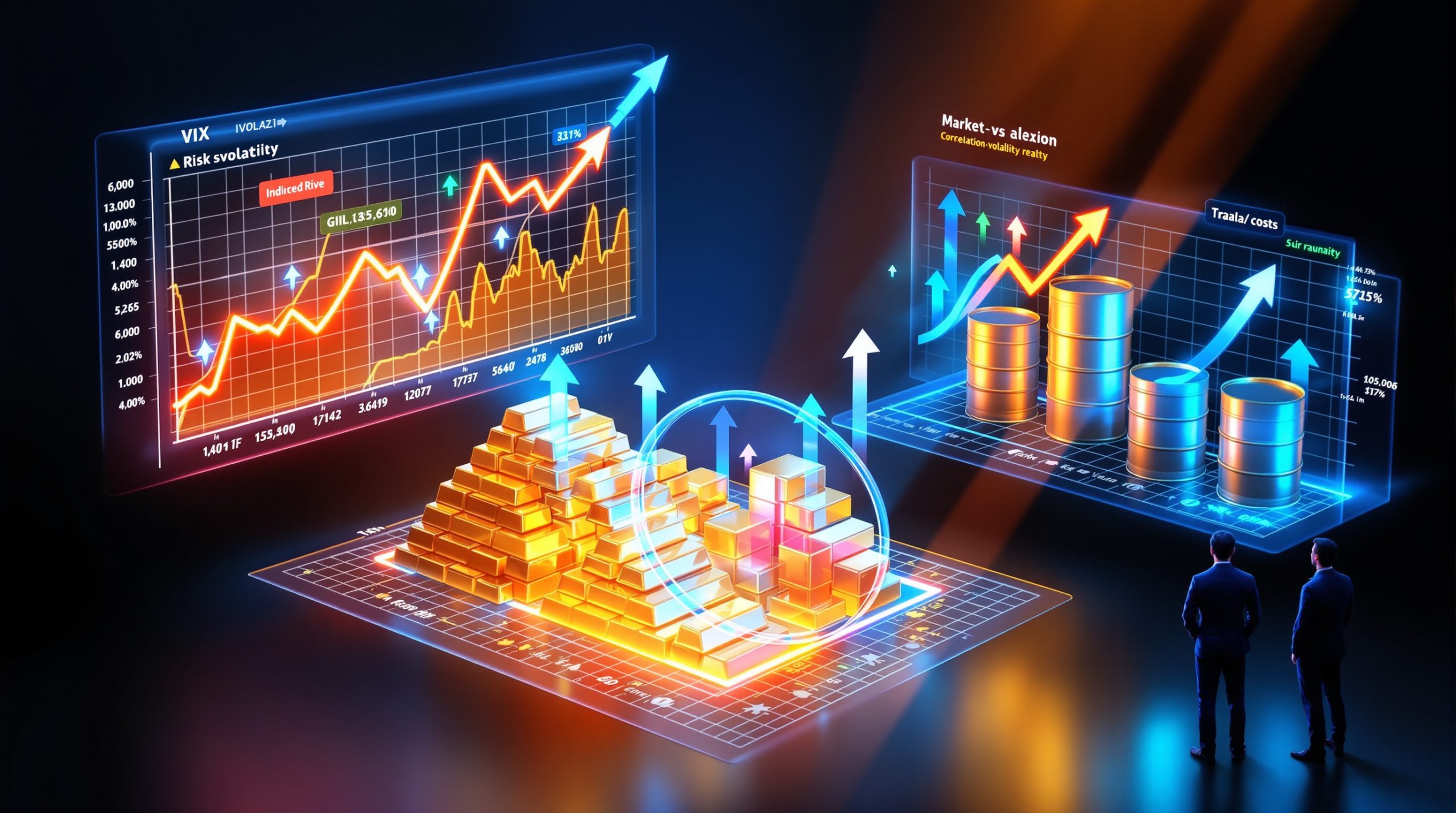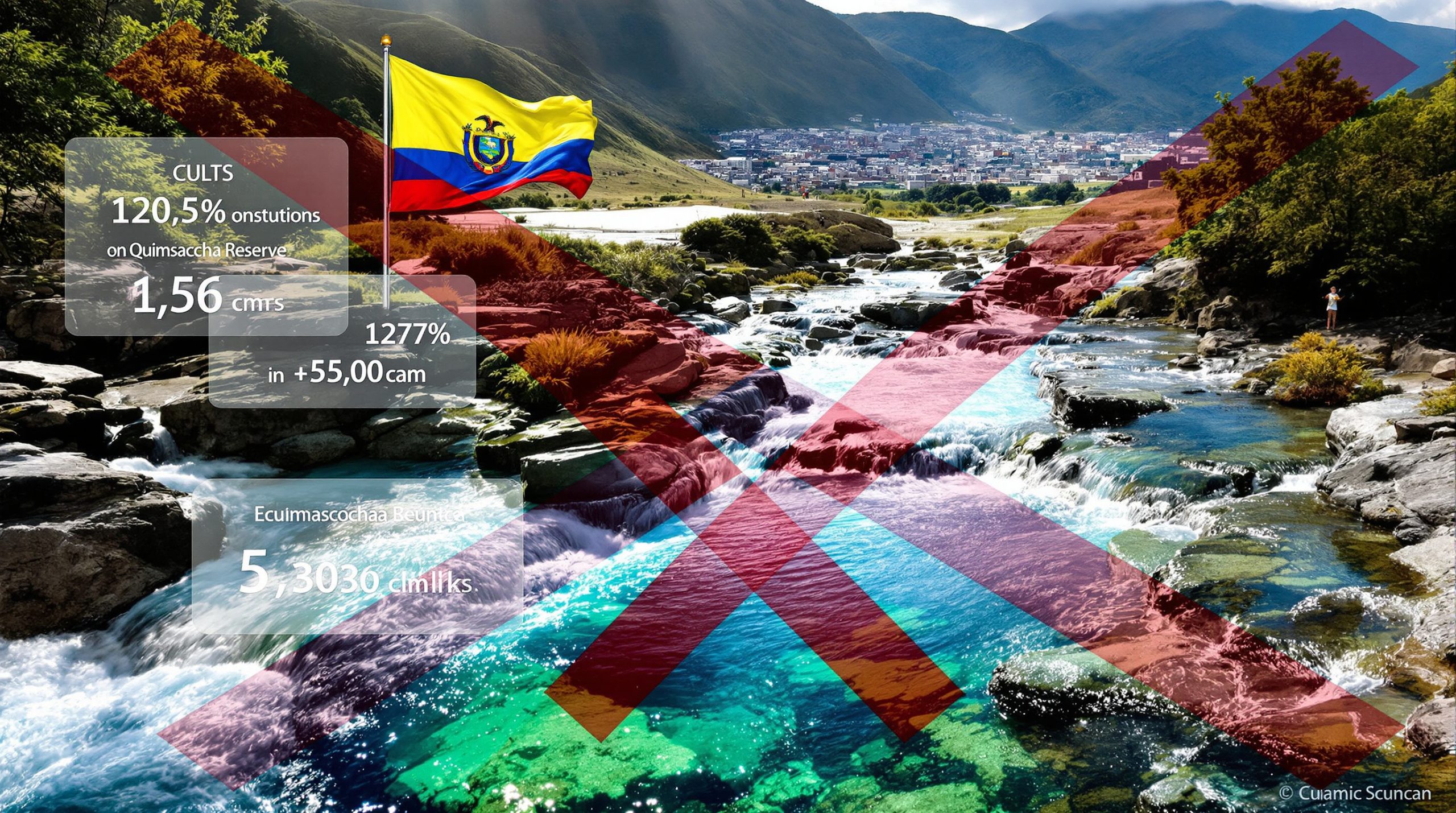What is Freeport's New Divestment Agreement in Indonesia?
Freeport-McMoRan has agreed to divest an additional 12% stake in PT Freeport Indonesia to the Indonesian government at no cost, according to recent reports from CNBC Indonesia. This pivotal agreement follows high-level meetings between Freeport CEO Kathleen Quirk and Rosan Roeslani, head of Indonesia's Danantara sovereign wealth fund, held in the United States in September 2025.
The no-cost share transfer represents a significant development in the ongoing negotiations regarding Freeport's license to operate the Grasberg copper mine beyond its current expiration date of 2041. This latest agreement builds upon the landmark 2018 divestment, which saw the Indonesian government secure a 51% majority stake in the operation.
With this additional 12% stake, the Indonesian government will increase its ownership of PT Freeport Indonesia to 63%, further cementing its control over one of the world's most productive copper mines. Industry analysts view this as a strategic move by Freeport to secure long-term operational certainty despite surrendering greater ownership without direct financial compensation.
Key Details of the Divestment
The divestment includes several noteworthy elements that distinguish it from previous agreements:
- The 12% stake will be transferred "free of charge" to the Indonesian government, unlike the 2018 divestment which involved complex financial arrangements
- Agreement was reached during high-level discussions between Indonesian officials and Freeport's leadership team in the United States
- The divestment serves as a key component of broader negotiations for extending Freeport's operating license beyond 2041
- It represents a continuation of the process begun with the previous 51% divestment completed in 2018
This move marks a significant evolution in the relationship between the mining giant and the resource-rich nation, transforming what was once a primarily foreign-controlled operation into a partnership with substantial domestic ownership.
How Does This Build on Indonesia's Resource Nationalism Strategy?
The additional 12% divestment represents a clear continuation of Indonesia's resource nationalism strategy, which has gained significant momentum over the past decade. By increasing its ownership stake to 63%, the Indonesian government has further solidified its position as the controlling partner in one of the world's most significant copper mining operations.
This strategic approach aligns with broader trends across resource-rich nations globally, where governments are increasingly seeking greater control and economic benefits from their natural resources. For Indonesia, the Grasberg mine represents both a crucial economic asset and a symbol of national sovereignty over its mineral wealth.
Industry experts note that Indonesia's negotiating position has strengthened considerably since earlier disputes with Freeport, reflecting both changing global dynamics in the mining industry consolidation and Indonesia's growing confidence in asserting control over strategic assets.
Evolution of Government Ownership in Freeport Indonesia
The transformation of Freeport Indonesia's ownership structure has been dramatic and represents a model for resource sovereignty implementation:
- Prior to 2018, Freeport-McMoRan maintained majority control of the Grasberg operation
- The 2018 agreement established Indonesian government majority ownership at 51%
- The new 12% divestment increases government control to 63%
- This progression demonstrates Indonesia's systematic implementation of its resource sovereignty agenda
- The relationship has evolved from foreign-dominated to majority domestic ownership
These changes have occurred despite initial resistance from Freeport, highlighting Indonesia's determination to reshape its resource governance models to prioritize national interests while still maintaining partnerships with international mining expertise.
Historical Context of Indonesia-Freeport Relations
The relationship between Freeport and Indonesia has experienced significant tensions and challenges:
- Previous negotiations over the 51% divestment dragged on for years, involving complex disputes
- In 2017, production at Grasberg was halted for weeks after the government banned concentrate exports
- Freeport threatened to take Indonesia to arbitration over mining law changes it claimed violated its contract
- Contentious issues included tax rates, waste management practices, and ownership structure
- The current agreement reflects Indonesia's substantially strengthened bargaining position
This history of contentious negotiations underscores the significance of the current agreement, which appears to have been reached with less public conflict than previous arrangements, suggesting both parties have developed more effective ways of resolving differences.
Why is the Grasberg Mine Strategically Important?
The Grasberg mine's strategic importance extends far beyond its immediate economic value to both Freeport and Indonesia. As the world's second-largest copper mine by production volume, it plays a crucial role in global copper supply forecast for a metal that has become increasingly vital to the global energy transition and technological development.
Located in Papua's central highlands, the mine operates in complex terrain that presents significant operational challenges. These challenges were dramatically highlighted by the recent flooding disaster that forced Freeport to declare force majeure—a clause invoked when unforeseeable circumstances prevent a company from fulfilling its contractual obligations.
The mine's significance is further amplified by its substantial gold production as a by-product of copper mining operations, making it a dual-commodity asset of exceptional value. This combination of copper and gold exploration creates a resource of remarkable economic and strategic importance on the global stage.
Grasberg's Global Significance
Grasberg's position in global mining is defined by several key attributes:
- Ranks as the world's second-largest copper mine by production volume
- Represents a critical node in global copper supply chains
- Produces significant quantities of gold as a valuable by-product
- Located in challenging mountainous terrain in Papua's central highlands
- Operations require sophisticated engineering and logistics solutions
The mine's output plays a vital role in meeting global demand for copper, which continues to grow due to electrification trends and renewable energy infrastructure development. Any significant disruption to Grasberg's production, therefore, has potential ripple effects throughout global metals markets.
Production Capabilities and Challenges
Recent events have highlighted the operational vulnerabilities at Grasberg:
- A severe flooding incident led to force majeure declaration in 2025
- Approximately 800,000 tons of mud flooded underground tunnels
- At least two workers lost their lives in the disaster
- Production guidance was significantly reduced for both current and upcoming years
- Share prices experienced substantial declines following production disruption announcements
These challenges demonstrate that despite its world-class status, Grasberg remains vulnerable to both natural disasters and operational complexities. Recovery efforts require extensive resources and technical expertise, underscoring the complex relationship between Freeport's operational capabilities and Indonesia's strategic resource interests.
What Are the Implications for Global Copper Markets?
The restructuring of Grasberg's ownership occurs against a backdrop of increasing copper demand and supply chain concerns worldwide. As one of the world's premier copper producing assets, developments at Grasberg have significant implications for global markets and pricing.
The recent force majeure declaration following flooding at the mine provides a stark reminder of how quickly production can be disrupted at even the most established operations. With copper price predictions hovering around $4.83 per pound as of late September 2025, any significant production shortfalls from major mines like Grasberg create market volatility.
Industry analysts note that the copper market is particularly sensitive to supply disruptions due to limited global stockpiles and the metal's growing importance in renewable energy technologies and electric vehicle manufacturing. The Grasberg situation underscores the concentrated nature of global copper production and the risks this concentration poses.
Supply Chain Vulnerabilities
The Grasberg situation highlights several systemic vulnerabilities in global copper supply chains:
- Production disruptions at major mines can have outsized impacts on global availability
- Concentration of production in a limited number of world-class deposits creates systemic risk
- Growing demand from energy transition technologies is increasing pressure on existing supply
- Geopolitical considerations increasingly influence access to strategic mineral resources
- Natural disasters and operational challenges can cause rapid production curtailments
These vulnerabilities are particularly concerning given copper's classification as a critical minerals reserve for energy transition and technological development. The metal's limited substitutability in many applications makes supply security an increasing priority for both industrial consumers and governments.
Market Response
Market reactions to developments at Grasberg reflect the mine's importance:
- Production curtailments have contributed to copper price volatility
- Investors are reassessing risk profiles for major copper assets globally
- Greater attention is being paid to geopolitical factors in mining investment decisions
- Mining companies face increasing scrutiny regarding their relationships with host governments
- Resource nationalism trends are being factored into long-term copper supply forecasts
The financial impacts of production disruptions highlight the delicate balance between operational stability and ownership arrangements. For Freeport, maintaining access to Grasberg's resources justifies accepting diminished ownership stakes, while for Indonesia, securing greater control over the asset represents both economic and strategic priorities.
How Does This Reflect Changing Mining Investment Patterns?
The Freeport-Indonesia agreement exemplifies fundamental shifts occurring in global mining investment patterns. Traditional models where foreign companies maintained majority control over resource extraction are increasingly giving way to partnerships with substantial host country ownership and influence.
This evolution reflects changing power dynamics in the mining sector, where resource-rich nations have strengthened their bargaining positions relative to multinational mining corporations. Companies must now navigate more complex stakeholder environments while still delivering returns to shareholders.
For mining executives and investors, these changes necessitate more sophisticated approaches to country risk assessment and stakeholder engagement. The ability to form productive partnerships with host governments and local communities has become as important as technical mining expertise in determining long-term project success.
Evolving Resource Governance Models
The mining industry is experiencing fundamental shifts in how projects are structured and governed:
- Movement away from traditional concession models toward shared ownership structures
- Resource nationalism gaining momentum across mineral-rich nations globally
- Host countries placing greater emphasis on capturing economic benefits beyond simple tax revenues
- Mining companies developing more nuanced approaches to government and community partnerships
- Long-term success increasingly dependent on alignment with national development objectives
These evolving governance models require mining companies to rethink their approach to project development and stakeholder engagement. The ability to navigate complex political environments and demonstrate tangible benefits to host nations has become a core competency for successful international mining operations.
Investment Considerations
For mining investors and executives, these changing patterns create new risk assessment challenges:
- Country risk assessments must incorporate more sophisticated political analysis
- Strategic minerals face increasing likelihood of government intervention or ownership requirements
- Long-term planning must account for evolving regulatory environments and changing ownership structures
- More resources must be devoted to stakeholder engagement at all levels
- Project economics must remain viable despite potentially reduced ownership percentages
Companies that adapt effectively to these new realities can still achieve strong returns while building more sustainable relationships with host governments. Those that resist these changes may find themselves facing increasingly difficult operating environments and potential conflicts with host nations.
What Challenges Face the Freeport-Indonesia Partnership?
Despite the agreement on additional divestment, significant challenges remain for the Freeport divestment in Indonesia partnership. The immediate priority is recovering from the devastating flooding that triggered the force majeure declaration, which requires substantial technical resources and coordination between Freeport's operational teams and Indonesian stakeholders.
Beyond the immediate recovery efforts, the partnership must navigate the complexities of shared governance while maintaining operational efficiency. With government ownership increasing to 63%, decision-making processes will likely become more complex, requiring clear governance frameworks to avoid operational bottlenecks.
The partnership also faces the ongoing challenge of balancing commercial objectives with national development priorities. While Freeport naturally focuses on maximizing returns on investment, Indonesian stakeholders have broader objectives related to economic development, employment, and downstream value addition.
Operational Complexities
The partnership faces several operational challenges:
- Implementing effective recovery plans following the recent flooding disaster
- Maintaining production efficiency under increasingly shared governance structures
- Balancing commercial imperatives with national development objectives
- Managing complex stakeholder relationships in the Papua region
- Implementing world-class environmental and safety practices in challenging conditions
Successfully addressing these operational challenges requires both technical expertise and effective cross-cultural communication. As ownership structures evolve, maintaining operational excellence becomes more complex but remains essential for all stakeholders to achieve their objectives.
Future License Negotiations
While the current agreement represents significant progress, important negotiations still lie ahead:
- Current operating license expires in 2041
- Extension negotiations will likely involve additional commitments from Freeport
- Future agreements may include further divestment requirements or changed financial terms
- Environmental and social performance will be increasingly critical to license renewal
- Changing global copper markets will influence the leverage of both parties
These future negotiations will occur in a context of evolving global mining standards and changing expectations regarding resource governance. Both parties will need to maintain constructive dialogue to ensure the long-term viability of their partnership.
What Does This Mean for Indonesia's Mining Sector?
The Freeport divestment agreement establishes important precedents for Indonesia's broader mining sector. As one of the country's most significant mining operations, developments at Grasberg often signal the direction of national policy toward the extractive industries.
The agreement demonstrates Indonesia's commitment to increasing domestic control over strategic mineral assets while still maintaining relationships with international mining companies that bring technical expertise and capital. This balanced approach aims to maximize the benefits of resource development for the Indonesian economy while still attracting necessary foreign investment.
For other mining operations in Indonesia, the Freeport agreement likely signals continued implementation of resource nationalism policies, albeit with pragmatic flexibility when necessary to ensure operational continuity. Companies operating in Indonesia will need to prepare for similar ownership evolution over time.
Regulatory Framework Evolution
Indonesia's mining regulatory framework continues to evolve in several key areas:
- Shift from Contract of Work system to Special Mining Permit (IUPK) framework
- Increased government influence over strategic mineral assets
- Expanded role for sovereign wealth funds in resource management
- Development of frameworks for domestic processing and value addition
- Potential application of Grasberg model to other foreign-operated mines
These regulatory changes reflect Indonesia's strategic objective of capturing greater value from its mineral resources while developing domestic capabilities across the mining value chain. The Freeport agreement represents a practical implementation of these broader policy objectives.
Economic Impact
The increasing domestic ownership of Grasberg will have several economic implications:
- Greater government revenue share from mining operations
- Enhanced domestic participation in mineral value chains
- Support for development of downstream processing capabilities
- Challenge of balancing foreign investment attraction with resource sovereignty
- Potential for knowledge and technology transfer to domestic mining sector
Maximizing these economic benefits requires careful management of the transition to increased government ownership. While gaining greater control of assets is an important first step, the ultimate economic impact depends on effective governance and strategic deployment of the resulting financial and technical resources.
How Might Other Mining Companies Respond?
The Freeport-Indonesia agreement will likely prompt strategic reassessments across the mining industry, particularly for companies operating in resource-rich nations with increasing resource nationalism tendencies. Forward-thinking mining executives are already adapting their approaches to account for these changing dynamics.
Rather than resisting increased government participation, some companies are proactively proposing partnership structures that accommodate host country objectives while preserving operational control and economic returns. This approach recognizes that fighting against resource nationalism often proves counterproductive in the long run.
Companies with existing operations in Indonesia will be particularly attentive to the details and implementation of the Freeport agreement, as it may establish precedents for their own future negotiations with the government. The mining industry as a whole will monitor how the shared governance model functions in practice.
Strategic Adaptations
Mining companies are implementing various strategic adaptations:
- Reassessing investment approaches in countries with resource nationalism tendencies
- Developing more sophisticated government relations capabilities
- Increasing focus on community development and maintaining social license
- Exploring joint venture models that preemptively address ownership expectations
- Emphasizing technology transfer and local capability development
These adaptations reflect recognition that the traditional mining investment model is evolving, and companies that adapt proactively will be better positioned for long-term success in complex operating environments.
Risk Mitigation Approaches
Effective risk management in this changing landscape involves several approaches:
- Geographic diversification of asset portfolios to reduce exposure to any single jurisdiction
- Enhanced political risk analysis capabilities and scenario planning
- More robust crisis management and business continuity planning
- Stronger alignment with sustainable development goals and ESG principles
- Development of flexible operating models that can adapt to changing ownership structures
By implementing these risk mitigation strategies, mining companies can maintain viable operations even in challenging jurisdictions. The key is viewing government relationships as strategic partnerships rather than adversarial negotiations.
What Are the Broader Geopolitical Implications?
The evolving relationship between Freeport and Indonesia reflects broader geopolitical shifts in resource governance and access. As critical minerals like copper gain strategic importance for energy transition and technological development, control over major deposits increasingly carries geopolitical significance beyond pure economic considerations.
Indonesia's assertion of greater control over Grasberg represents part of a wider pattern of resource-rich nations strengthening sovereignty over strategic minerals. This trend is particularly notable in the context of growing global competition for access to critical mineral resources needed for renewable energy technologies and advanced manufacturing.
For the United States and other nations dependent on mineral imports, these developments highlight the increasing complexity of securing stable supply chains for critical minerals. The changing ownership structure at Grasberg, while involving a U.S.-based company, ultimately increases Indonesian government control over a globally significant copper source.
Regional Resource Dynamics
The Freeport agreement influences regional resource governance in several ways:
- Indonesia is establishing itself as a leader in asserting resource sovereignty
- Other Southeast Asian nations may adopt similar approaches to resource governance
- Regional copper supply security takes on increasing strategic importance
- Power dynamics between mining companies and host nations continue to evolve
- Resource diplomacy becomes an increasingly important aspect of regional relations
These regional dynamics play out against a backdrop of broader geopolitical competition, with various powers seeking to secure access to critical mineral resources or influence over their production and distribution.
Global Critical Minerals Landscape
The Grasberg situation highlights several important aspects of the evolving critical minerals landscape:
- Copper increasingly viewed as a strategic resource for energy transition technologies
- Growing government intervention in critical mineral supply chains worldwide
- Changing patterns of resource control affecting investment decisions and supply security
- Traditional mining investment models adapting to new geopolitical realities
- International trade and investment agreements facing pressure from resource nationalism
These developments underscore the need for more sophisticated approaches to critical mineral supply chain security that account for both commercial and geopolitical considerations. Companies, investors, and governments all face the challenge of navigating this increasingly complex landscape.
Frequently Asked Questions About Freeport's Indonesian Divestment
How does this divestment compare to previous agreements?
The current 12% divestment differs significantly from the previous 51% divestment completed in 2018. While the earlier agreement involved complex financial arrangements and protracted negotiations, the new agreement appears to involve a no-cost transfer of shares. This suggests Indonesia's substantially strengthened negotiating position, as Freeport appears willing to surrender additional ownership without direct compensation to secure long-term operational certainty through license extension.
What does this mean for Freeport's shareholders?
Freeport shareholders face a mixed outlook from this agreement. The no-cost divestment represents a reduction in ownership percentage without immediate financial compensation, which could be viewed negatively in isolation. However, if the agreement secures long-term operational certainty through license extension beyond 2041, it potentially preserves the long-term value of Freeport's interest in one of the world's premier copper assets. Ultimately, shareholders must weigh reduced ownership against enhanced certainty in a critical asset.
How might this affect future mining investments in Indonesia?
This agreement establishes important precedents for mining investments in Indonesia. Companies considering investments must now factor in potential ownership evolution over time, with the expectation that government ownership will likely increase. This may lead to more conservative initial valuation models that account for future divestment requirements. However, Indonesia's pragmatic approach—balancing increased ownership with operational continuity—may actually provide a workable framework that maintains investment attractiveness despite ownership changes.
What role will Indonesia's sovereign wealth fund play?
The involvement of the Danantara sovereign wealth fund in negotiations suggests an increasingly sophisticated approach to resource governance. Rather than direct ministerial control, Indonesia appears to be developing institutional capacity for professional management of state mining interests. The sovereign wealth fund potentially provides a more commercially-oriented governance structure while still maintaining government control. This approach could balance national development objectives with operational efficiency better than traditional direct government management.
Reshaping the Future of Mining Partnerships
The Freeport divestment represents a significant milestone in the evolution of mining investment structures globally. As resource-rich nations increasingly assert sovereignty over their mineral wealth, traditional models of foreign-controlled extraction continue giving way to more balanced partnership approaches. For mining companies, success increasingly depends on the ability to navigate complex stakeholder environments and align operations with national development priorities.
The Grasberg case demonstrates both the challenges and opportunities in this new paradigm. While ownership transitions create uncertainty and adjustment periods, they can ultimately establish more sustainable operating frameworks when managed effectively. The mining sector's future will likely see continued evolution toward models that more equitably distribute benefits while maintaining the operational expertise and capital that international mining companies provide.
This shift doesn't signal the end of international mining investment but rather its transformation. Companies that adapt effectively to these changing expectations can still achieve strong returns while building more sustainable relationships with host governments. Those that resist these changes may find themselves increasingly at odds with host nations and vulnerable to regulatory interventions or contract renegotiations.
For Indonesia, the increased ownership of Grasberg represents an important step in maximizing the benefits from its natural resources. The true measure of success, however, will be how effectively this ownership translates into sustainable economic development and improved outcomes for Indonesian citizens. This requires not just ownership changes but effective governance, strategic investment of proceeds, and continued operational excellence at this world-class mining asset.
Looking to Capitalise on the Next Major ASX Mining Discovery?
Stay ahead of market movements with Discovery Alert's proprietary Discovery IQ model, which provides instant notifications when significant mineral discoveries are announced on the ASX. Visit the Discovery Alert discoveries page to understand how historic discoveries like those mentioned in this article have generated substantial returns for early investors.




